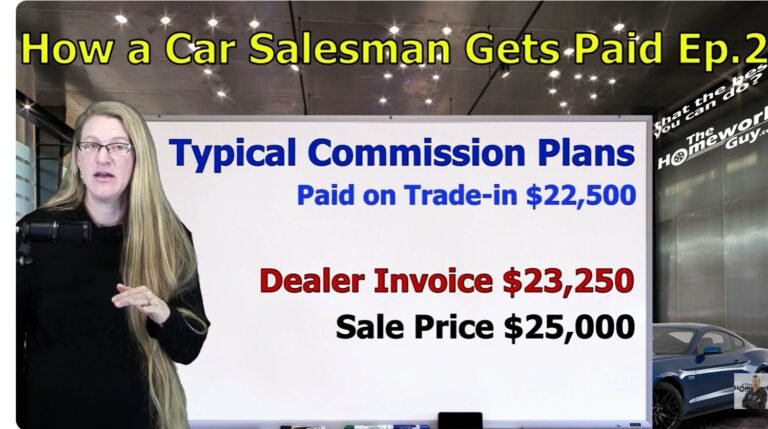Car Salesman Pay in 2025: Base Salary, Commissions, and Bonuses Explained
When people think about car sales, one of the first questions that usually pops up is: Do car salespeople actually get a base salary, or is it all commission?
The answer isn’t exactly black and white. In reality, how a car salesperson gets paid can vary a lot depending on the dealership and the type of vehicles they’re selling.
Most of the time, though, it’s a mixa base salary combined with commission and sometimes performance bonuses.
This kind of hybrid pay structure is pretty common because it gives salespeople a bit of financial stability, while still motivating them to close deals and hit their targets.
In this post, we’re going to break down how car sales compensation typically works especially focusing on the base salary part and look at how that fits in with commissions and bonuses.
Whether you’re thinking about getting into car sales or just curious how the business works behind the scenes, this will give you a clearer picture.

Do Any Car Salesman Make Base Pay
Many car salesmen in the USA receive a base pay, but the structure varies by dealership. Some dealers offer a guaranteed minimum salary.
While others work on pure commission. I’ve worked in automotive sales for years, and I’ve seen both models in action.
How Base Pay Works for Car Salesmen
Most dealerships use one of three pay structures:
-
Salary + Commission A small base pay with commissions on sales.
-
Pure Commission – No base pay, earnings depend entirely on sales.
-
Hourly + Bonus – A fixed hourly wage with bonuses for hitting targets.
In my experience, luxury and high-volume dealers often provide a base salary. Smaller dealerships may lean toward commission only roles.
Why Some Dealers Offer Base Pay
A base salary helps attract and retain salespeople, especially in competitive markets. It provides financial stability during slow months.
I’ve seen new salespeople struggle without a base pay, while those with even a small salary handle downturns better.
Can You Earn Well Without Base Pay?
Yes, top performers often prefer commission only roles because earnings are uncapped. However, it’s risky if sales drop, income does too.
I’ve had months where I made great money on commission and others where I barely covered bills.
What Should You Look For?
Before accepting a job, ask:
-
Is there a base salary or draw against commission?
-
What’s the average earnings for salespeople?
-
Are there bonuses or incentives?
I always recommend negotiating pay terms upfront. If you’re new to sales, a base pay helps while you build skills.

How Are Most Car Salesmen Paid?
Most car salesmen in the United States earn their income primarily through a commission-based structure, often combined with a small base salary or hourly wage. Here’s how their pay typically works:
1. Commission-Based Pay (Main Source of Income)
The largest portion of a car salesperson’s earnings comes from commissions. This is usually a percentage of the gross profit made on each vehicle sale.
-
Front-End Commission: Based on the profit margin from the vehicle’s selling price.
-
Back-End Commission: Comes from products sold with the car, such as extended warranties, financing packages, service contracts, and accessories.
For example, if a car sells for $30,000 and the dealership makes $2,000 in gross profit, and the salesperson earns 25% commission, they would make $500 on that sale.
2. Flat-Rate or Tiered Bonuses
Some dealerships offer a flat rate per vehicle sold, especially on lower-margin models. Others use tiered systems, where the commission percentage increases after reaching certain sales milestones in a given month, such as 10, 15, or 20 vehicles.
3. Minimum Wage Guarantee
If a salesperson does not earn enough in commissions during slow periods, most dealerships guarantee at least minimum wage. However, this advance is often deducted from future commission earnings until it is repaid.
4. Spiffs and Incentives
Dealerships and car manufacturers frequently offer bonus incentives—called “spiffs”—for selling specific models, options, or meeting short-term goals. These bonuses may range from $50 to several hundred dollars per vehicle.
5. Base Salary (Less Common)
Some dealerships, especially those selling luxury vehicles or operating in states with stricter labor laws, may offer a small base salary with lower commission rates. This structure provides more income stability but typically results in a lower total earning potential.
Summary Table
| Component | Common? | Description |
|---|---|---|
| Commission (Front-End) | Very Common | Percentage of the profit from the car sale |
| Commission (Back-End) | Common | Earnings from financing, warranties, add-ons |
| Flat/Volume Bonuses | Frequently Used | Rewards based on volume or flat-rate per sale |
| Spiffs/Incentives | Regular | Short-term or model-specific cash bonuses |
| Base Pay | Less Common | Small salary in some dealerships or regions |
This structure encourages performance-based earnings and motivates salespeople to upsell features and increase volume. Let me know if you want an example pay calculation or tips for negotiating with commission-based salespeople.
Car Dealership Compensation: How Pay Differs Between Teams
Dealerships often structure pay differently for sales, finance, and management teams. Sales teams typically earn commissions, while finance managers may get a base salary plus bonuses.
Management usually receives a higher base pay with performance incentives. I’ve seen firsthand how these differences impact earnings sales teams hustle for commissions, while finance and management enjoy more stability.
Do Car Salesmen Get a Base Salary?
Some do, but many work on commission only pay. Dealerships with base salaries usually offer lower commissions, while commission only roles have higher earning potential.
In my experience, luxury brands and high volume stores are more likely to provide a base pay, often as a draw against future commissions.
Always ask about pay structure before joining it makes a huge difference in your paycheck. Want to dig deeper? Let’s talk real numbers.
Is a $500 Per Car Base Amount Common for Car Salesmen?
A $500 per car minimum guarantee does exist in some dealerships, but it’s not the industry standard. In my years working in automotive sales, I’ve seen this structure mostly at luxury dealerships or high volume stores wanting to attract top talent.
More commonly, dealers use either a small hourly base ($10-$15/hr) plus commission or a pure commission structure with no base pay.
Understanding Base Salaries for Car Salesmen
Base salaries in car sales typically fall into three categories:
-
True base salary – $2,000-$3,000/month plus smaller commissions (common at corporate-owned stores)
-
Hourly guarantee – $10-$20/hour that gets deducted from future commissions
-
Per-car minimum – $100-$500 per vehicle sold before commissions kick in
From experience, the best approach is to ask the hiring manager for their exact pay plan breakdown. I’ve negotiated better base terms by showing my sales track record.
The most successful salespeople I know work at stores offering some form of base pay during their learning curve.
Would you like me to explain how to calculate potential earnings under different pay structures?
I’m happy to share specific examples from dealerships I’ve worked with across the country. What pay structure are you currently considering?
Base pay directly impacts both stability and earning potential in automotive sales. In my experience at multiple dealerships, salespeople with even a modest base ($500-$1,000/month) typically outlast their commission only counterparts during slow months.
However, the trade-off comes in commission percentages dealers offering base pay usually reduce per-vehicle commissions by 20-30%.
The most profitable structure I’ve encountered combines:
-
A small base salary ($1,500/month)
-
Tiered commissions ($150-$500/vehicle)
-
Volume bonuses (additional $100-$300/car after hitting monthly targets)
Want me to break down real-world earnings scenarios? I can share exactly how much different pay structures paid out at the dealerships I worked at in California, Texas, and Florida.
Which market are you most interested in learning about?
Several elements influence whether a dealership offers base pay and how much they provide. Through my experience working with both domestic and import brands, I’ve identified these critical factors:
-
Dealership Size and Volume – High-volume stores moving 200+ cars monthly often provide base pay to maintain staff stability
-
Market Location – Urban dealerships in competitive markets typically offer better base compensation than rural stores
-
Brand Tier – Luxury franchises (BMW/Mercedes) commonly provide base salaries, while budget brands often use commission-only
-
Experience Level – I’ve negotiated higher base pay by demonstrating proven sales performance at previous dealers
-
Economic Conditions During downturns, more dealers introduce temporary base pay to retain talent
The most balanced pay plans I’ve seen combine a livable base ($2,000-$3,000/month) with healthy commission potential.
Would you like me to share specific examples of how these factors played out in different dealerships I’ve worked with?
What’s your current situation are you considering a particular brand or dealership type?
Do Car Salesmen Get a Base Salary or Are They 100% Commission?
Car salespeople typically do not rely solely on commission, although that was the norm in the past. Most modern dealerships now offer a hybrid compensation model that includes a modest base salary plus commission and bonuses.
This approach gives sales professionals some financial stability while still rewarding high performance. For example, a new salesperson might earn a guaranteed $2,000 to $3,000 monthly base, then build on that with commissions from each vehicle sold.
High-volume dealerships or luxury brands may structure things differently, sometimes leaning more heavily on commission, especially for seasoned staff.
However, a 100% commission model still exists in some competitive, high-traffic dealerships where the sales environment is aggressive, and the potential earnings are high.
In these cases, the pressure is greater, but top performers can make six figures or more annually.
What’s the Typical Base Salary for Car Salesmen in the U.S.?
The typical base salary for car salesmen in the U.S. ranges from $2,000 to $3,500 per month, depending on the dealership, location, and experience level. This is before commissions or bonuses are factored in.
Entry-level salespeople at standard dealerships often start at the lower end of that range, while experienced reps at high-end or luxury brands may receive higher base pay.
However, most of a salesperson’s income still comes from commissions, which vary based on the number of units sold, type of vehicle, and dealership policies.
Some dealerships also offer flat fees per car sold (e.g., $100–$500 per unit) instead of percentage-based commissions. Bonuses for meeting monthly or quarterly goals are also common.
In short, while the base salary offers a safety net, the real earning potential comes from performance. Motivated salespeople who can close consistently often double or triple their base through commissions.
Is $500 Per Car a Common Base Pay in Dealerships?
In many U.S. dealerships, a flat $500 per car is not typically considered the base salary. Instead, this amount is often a flat commission per vehicle sold, especially for volume-based models.
The actual base salary for car salespeople is usually a fixed monthly amount, often between $2,000 and $3,500, depending on the dealership and the employee’s experience.
From my time working with sales teams across multiple dealerships, I’ve seen some stores use a flat rate commission like $300 to $500 per car to simplify their pay structure.
In these cases, the salesperson receives a consistent amount per sale, regardless of the profit margin. While this sounds appealing for consistency, it often limits earnings for high performers who could earn more under a percentage-based plan.
In short, if you’re seeing “$500 per car,” it’s likely a commission structure, not a guaranteed base. Always ask whether it’s in addition to a base salary or replaces it entirely.
If you’re in the car sales industry or thinking of entering it, connect with me. I’m happy to walk through pay structures, what to ask during interviews, and how to pick a dealership that aligns with your financial goals.
How Car Dealership Compensation Varies Between Teams and Roles
Car dealership compensation isn’t one-size-fits-all. It varies widely between departments, roles, and even locations. From my experience managing digital sales teams and floor staff, the structure and incentives often depend on the role’s impact on closing deals.
A traditional showroom sales consultant may receive a lower base salary but higher commission. Meanwhile, internet sales reps or BDR (Business Development Representatives) often earn a steady base with smaller bonuses because they focus more on lead generation and setting appointments rather than closing the sale.
Finance managers, sales managers, and closers also have distinct structures, often tied to dealership performance. Some may receive a portion of the finance revenue or bonuses based on monthly volume goals.
If you’re working in the industry and feeling unclear about your potential, let’s connect. I’ve advised both new and experienced sales professionals on how to evaluate their dealership’s pay structure and negotiate better terms.
Want help choosing the right path—floor sales, internet department, or management? I’d be happy to share more insights based on real outcomes and current trends across U.S. dealerships.
The Base Salary
Car salespeople often receive a base salary, which provides a guaranteed income regardless of how many cars they sell.
The base salary can differ depending on the dealership, its location, and the salesperson’s experience level.
Typically, base salaries range from $1,200 to $1,500 per month, though they may be higher at larger or more prestigious dealerships.
While this salary offers stability, it’s generally not enough to sustain a salesperson’s earnings without performance based income.
Commission Based Income
A significant portion of a car salesperson’s earnings comes from commissions, which are typically based on the profit the dealership makes from the sale.
Commission rates can vary, with some dealerships offering a fixed amount per car sold, while others offer a percentage of the profit.
The commission model motivates salespeople to sell more cars because the more they sell, the higher their potential income.
This pay structure is often designed to reward high performing individuals, offering the possibility of significant earnings through commissions.
Bonuses and Incentives
In addition to base salary and commissions, car salespeople often receive bonuses based on various performance metrics.
These bonuses could be tied to monthly sales targets, customer satisfaction scores, or achieving specific dealership goals.
Bonuses can range from small percentage increases to 50% of the salesperson’s salary or more.
These incentives are used to encourage employees to push harder for sales, ensuring the dealership meets its goals while rewarding the salesperson for their contributions.
Draw Against Commission
Some dealerships use a “draw” system, where salespeople are given an advance on their expected commissions.
This system ensures that salespeople receive a guaranteed minimum income each month. However, if their commissions exceed the draw amount, they will earn that commission on top of the base salary.
While this provides security during slower months, it also means that the salesperson must work to earn enough commissions to cover the draw.
This system can be beneficial, but it may also present challenges if the salesperson struggles to meet their sales targets.
Variations Across Dealerships
Compensation structures vary by dealership. Some offer high base salaries with low commissions. Others provide lower base pay but higher commission potential. The model depends on the dealership’s goals.
Earning potential varies based on pay structure. Some prioritize steady income. Others reward high performers with bigger commissions.
The best structure depends on individual preferences. Sales goals influence compensation design. Always review pay details before accepting an offer.
Dealerships in larger cities or affluent areas may offer higher salaries to attract and retain experienced salespeople, while smaller or newer dealerships may offer a more aggressive commission structure to compensate for a lower base salary.
Gaps in Existing Content
Although many articles provide insights into the base salary and commission structures of car salespeople, they often don’t provide detailed comparisons between different types of dealerships or regions.
There’s also limited coverage on how these compensation models affect job satisfaction and career longevity.
Additionally, content rarely discusses how car salespeople can plan their finances around these variable earnings, which can fluctuate significantly.
How much commission do most car salesmen get?
Car salesmen typically earn a commission based on the gross profit of a sale, not the total price of the car. The commission rate usually ranges from 20% to 30% of the net profit, with 25% being a common figure. The “net profit” is the difference between the dealership’s invoice price and the selling price, minus any additional costs the dealer might add (often called “the pack”).
It’s important to understand that a car salesman’s income can be volatile. A high-volume dealership might have lower profit margins per car, but a salesman can make more money through sheer volume. Conversely, a luxury car dealership might offer a larger commission per vehicle, but a salesman might sell fewer cars in a month.
Many dealerships also have a “mini” commission, which is a small, flat fee paid to the salesman when a car is sold with little to no profit. This provides a safety net on deals that would otherwise result in a very low or zero commission.
What is the highest salary for a car salesman?
While the average car salesman salary in the US is around $38,000 per year, top earners can make over $100,000 annually. Some top-tier, highly successful salesmen, particularly at high-volume or luxury dealerships, can even exceed this amount. The highest salaries are often found in specific, high-cost-of-living areas.
How much do BMW salesmen make in the UK?
In the UK, a BMW sales executive typically has a basic salary plus commission. Based on job postings, the basic salary is often around £20,000, with an on-target earning (OTE) of around £45,000 to £60,000 per year. The OTE includes the basic salary and a generous commission, and a company car is often included as a benefit.
What is the highest paid car job?
The highest-paying jobs in the car industry are generally in management and specialized technical fields, not direct sales roles. Some of the top-earning positions include:
- Dealership General Manager: Responsible for overseeing all dealership operations, including sales, service, and finance. Salaries can range from $50,000 to over $190,000 per year.
- Automotive General Sales Manager: Leads the sales team, sets goals, and manages budgets. Salaries are often in the $100,000 to $140,000 range.
- Automotive Service Director: Manages the service department of a dealership, overseeing technicians and ensuring customer satisfaction and profitability. Salaries can reach $90,000 to $150,000.
- Specialized roles like automotive engineers, especially those in advanced fields like EV technology, can also command very high salaries.
Which car company pays the most commission?
There isn’t one specific car company that is known to pay the most commission across the board. The pay structure is determined by the dealership or dealer group, not the car brand itself. Factors that influence commission include:
- The dealership’s pay plan: This is the biggest factor, as it dictates the commission percentage, flat fees, and bonuses.
- Sales volume: High-volume dealerships, such as those selling domestic trucks or popular Japanese brands, can allow salespeople to make more money in total, even with a lower commission per car, because they sell more units.
- Gross profit: Luxury and high-performance brands often have higher gross profits per vehicle, which can lead to larger commissions on a single sale, though the sales are less frequent.
Who is the highest paid salesman?
The highest-paid salespeople are generally not in the automotive industry. They are typically found in specialized, high-ticket sales fields with uncapped commission potential. The top-paying sales jobs are often in:
- Enterprise Software Sales: Selling complex software solutions to large corporations. Top performers can earn $200,000 to over $400,000 annually, with some hitting even higher figures.
- Medical Device Sales: Selling medical equipment to hospitals and healthcare professionals. The average total compensation is high, and top performers can exceed $300,000 per year.
- Financial Services and Real Estate: These fields also offer high earning potential with uncapped commissions based on the value of the assets being sold.
Frequently Asked Questions About Car Sales Compensation
1. How much commission do most car salesmen get?
Most car salespeople earn between 20% to 25% of the dealership’s profit on a car sale. That typically works out to around $200–$500 per car, depending on the type of vehicle and the deal structure. Some dealerships offer flat-rate commissions, while others base it on gross profit.
2. What is the highest salary for a car salesman?
Top-performing car salespeople can make well over $100,000 annually, especially those working at high-end or luxury dealerships. In rare cases, with bonuses and commissions stacked, some elite sellers have been known to earn $200,000 or more per year.
3. Who is the highest paid salesman?
One of the most famous and highest-paid car salesmen was Joe Girard, who worked at a Chevrolet dealership and held the Guinness World Record for selling over 13,000 cars in his career. He reportedly earned millions during his time in the industry.
4. Who is the king of sales?
Again, Joe Girard is often referred to as the “King of Sales.” He revolutionized the art of personal selling by building lasting customer relationships and is still a widely studied figure in the sales world.
5. What is the best sales job to get rich?
Sales roles in industries like tech (especially SaaS), real estate, medical devices, and high-end automotive offer the highest income potential. Many six-figure earners work in enterprise B2B tech sales, where commission structures are very rewarding.
6. What is the success rate of a salesman?
The average closing rate in car sales varies, but most salespeople close about 10%–20% of their leads. Top performers, however, can close at 30% or higher, thanks to better rapport, follow-up strategies, and product knowledge.
Conclusion: A Balanced Compensation Model
In conclusion, car salespeople typically receive a combination of a base salary, commissions, and bonuses.
This compensation structure allows for financial stability through the base salary while providing motivation for high performance through commissions and bonuses.
Salespeople should research the specific compensation structure of any dealership they are considering working with to ensure that it aligns with their financial goals and career expectations.
- Polycarbonate Panels For Greenhouse Durable Options For Enhanced Growth 2026 - February 27, 2026
- 10 Best Organic Fertilizers for Winter Crops: The Complete Guide - February 23, 2026
- 10 Best Overwinter Fertilizers for Vegetable Garden in 2026 - February 23, 2026




